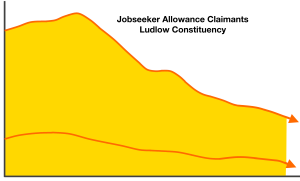Unemployment in the Ludlow constituency is still falling, bucking the national picture where unemployment crept upwards in May. But local wages still trail behind and are only nine-tenths of national wages.
Unemployment drops…
The number of people claiming Jobseeker’s Allowance, or not in work and claiming Universal Credit, in the Ludlow parliamentary constituency fell from 408 people in May to 382 in June. The claimant rate is now just 1%, two-fifths of the national rate of 2.5%. This is very good news. Unemployment in the constituency, as measured by Jobseekers claimants, has fallen by 67% since the height of the recession in February 2013.

Nationally, claimants increased by 7,000 between May and June 2015, to 804,200, the first monthly increase since October 2012. That’s not good news with the economy growing slowly and the introduction of the ‘living wage’ set to lead to the loss of 60,000 jobs according to the Office of Budget Responsibility.
The national unemployment rate was 5.6% in March-May 2015. The unemployment rate, known as the ILO measure, is usually around double the claimants rate because a lot of people can’t or don’t wish to claim Jobseekers or Universal Credit.
It’s good that unemployment is still falling locally but what is happening to wages?
But wages remain low…
Nationally wages are rising, up by 3.2% in the three months to May.
Wages have also been rising locally but they consistently lag behind national pay rates.
The graphs below tell the story. They look at the median wage – half of people in jobs earn less than this and half more.[1] They compare wages in the three Shropshire parliamentary constituencies with wages across the UK.


Over the last ten years, basic wages in Ludlow have been trailing the national median by £40 a week, £172 a month. Workers in the Ludlow constituency top up their income a little with overtime. With overtime, total local pay is £33 a week lower than the national median, £144 a month.
Again over the last ten years, Ludlow constituency wages have been running at 89% of the national median; 91% when overtime is taken into account.
In 2014, wages in the Ludlow constituency actually fell – though this is probably because the estimate of wages in 2013 was too high on account of a statistical blip.[2]
As I have said before, with unemployment falling we must now concentrate on getting better paid jobs into our low wage area.
Notes
[1]. Median: half of people in work earn less than this wage and half earn more. It gives a better indication of typical pay than the average (mean) which can be disproportionately skewed upwards by a small number of high-paying jobs.
[2]. The graphs show the overall trend but because they are based on samples of workers, not the entire workforce, they are prone to error. So it’s best not to rely on data for one particular year. The coefficient of variation (CV) for the Ludlow data is generally between 5%-10%. That means that the true value is most likely to lie within twice the value of the CV. So to take 2013, the median weekly basic wage zooms upwards from £369 in 2012 to £416. £47 in a year. Wow! If only this was true – but this doesn’t accord with any experience here in Bridgnorth, Ludlow and the rest of the constituency. And the data fall back to the general trend in 2014. It is simply inconceivable that such a variation could occur year on year in our fairly static labour market. So I can only conclude that this is a statistical blip. With a CV of 5%-10%, a weekly wage estimated £416 could in practice lie between £333 and a dizzying £499. That’s why we need to focus on trends, not individual years. The 2013 figure is nevertheless distorting. The differences between median weekly wage between UK and Ludlow between 2005 and 2014 is -£33; this rises to -£37 is 2013 is excluded.


I can remember first coming to live and work in Ludlow in the early 1990s after working and living in London and the South East. I did a double take at an advertisement in the job centre for a qualified heavy goods vehicle driver at about half the rate one would expect in the South of England.- Shropshire residents do not have easy access to work elsewhere and hence the employer is in a more than usually powerful position – workers are driven to take work that pays badly – were it elsewhere in the country the jobs would go unfilled.
So seemingly good news but not as good as it seems.
Of course the canceling of Tax Credits will also have a big impact on low wage areas like Shropshire. But I am confident that our Dear Leaders will take punitive action against those companies who do not pay the newly instigated Living Wage…………I am sure Mr Dunne is working on that as I write.
Of course the canceling of Tax Credits will also have a big impact on low wage areas like Shropshire. But I am confident that our Dear Leaders will take punitive action against those companies who do not pay the newly instigated Living Wage…………I am sure Mr Dunne is working on that as I write.